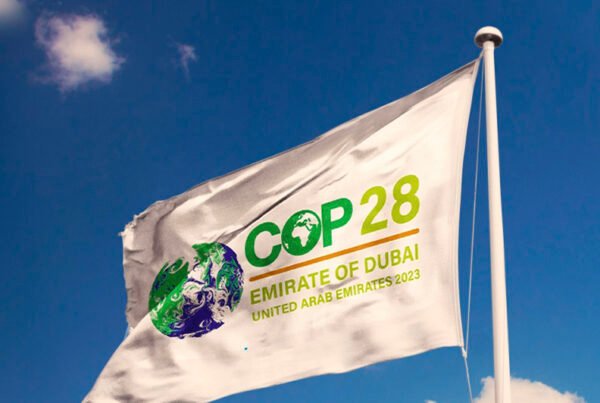On the 5th day of COP28, four fundamental themes were highlighted in the event’s agenda: Finance, Trade, Gender Equality, and Accountability.
The interconnection between global financial systems and climate change is becoming increasingly clear.
This approach reinforces the importance of dealing with these areas in an integrated manner, recognizing the direct impact of financial and commercial decisions on climate change.
Furthermore, it emphasizes the imperative need to promote gender equality and accountability on all fronts.
Continue reading to stay abreast of the highlights from the 5th day of COP28, the United Nations (UN) Conference on Climate Change, held in Dubai, United Arab Emirates.
Follow the exclusive coverage by Myr Group this Monday, December 4th!
Together, our directors, Sérgio Myssior and Thiago Metzker, provided a summary of this 5th day of the Climate Summit!
Sustainable and Equitable Energy Transition
Climate finance was once again at the center of discussions at COP28.
Through their banks, the event hosts, the United Arab Emirates, pledged $270 billion in green financing by 2030.
Various development banks also expanded their financing efforts and agreed to pause debt payments in cases of disasters.
However, the numbers still don’t add up!
According to a report released today, December 4th, emerging markets and developing countries will need annual investments of around $2.4 trillion to reduce GHG emissions and adapt to the challenges posed by climate change. Learn more in this Forbes report.
On the 5th day of COP28, the event’s Presidency held a roundtable focused on accountability and regulatory frameworks needed for a sustainable and equitable Net-Zero transition.
In this context, sustainable finances play a key role in enabling and financially supporting initiatives and projects that drive this transition.
Also read: Net Zero: The Path to a Sustainable Future and Brazil’s Potential
BNDES Announces a R$ 75 Million Investment in an Innovative Fund for Small and Medium-sized Enterprises in the Amazon
Through BNDESPar, its equity holdings arm, the National Bank for Economic and Social Development (BNDES) will invest R$ 75 million in small and medium-sized enterprises in the Amazon.
With the collaboration of other investors, this subsidy aims to raise the committed capital of the venture capital fund ‘Amazon Biodiversity Fund Brazil’ (ABF FIP) to R$ 235 million.
This amount will be allocated to investments in about 15 companies, with capital contributions ranging from R$ 4 million to R$ 20 million per asset. Learn more by reading this report from Época.
“The investment is another initiative of BNDES aligned with public policies promoting sustainable development of the Amazon and the green economy, with the differential of supporting impact entrepreneurship.”
Natália Dias
(Director of Capital Markets and Sustainable Finance at BNDES)
Enhance your knowledge on this topic by reading our blogs:
– Green Economy: Building a Sustainable and Prosperous Future
– Amazon 4.0: Innovation and Sustainable Development – Discover this Ambitious Project
Transparency and Sustainability for Brazilian Companies
During COP28, the Ministry of Science, Technology, and Innovation (MCTI) launched a platform to receive data on emissions from companies.
The platform called SIRENE accepts voluntary reports of greenhouse gas (GHG) emissions from public, private, or third-sector organizations, across all economic sectors.
This pioneering federal initiative encourages the engagement of organizations in Brazil’s climate ambition.
Learn more in today’s release from the Ministry of Science, Technology, and Innovation (MCTI).
Important Debates of the Day at the ICLEI Pavilion – Multilevel Action & Urbanization and at the Brazil Pavilion
Our directors, Sérgio Myssior and Thiago Metzker, followed some important debates on the agendas of the ICLEI Pavilion – Local Governments for Sustainability and the Brazil Pavilion today.
Check out:
– Sustainable Forest Management as a tool for fostering the bioeconomy and generating green jobs in the Amazon region;
– Inclusive Climate Adaptation in Cities: How are we preparing cities and their vulnerable areas for the impacts of climate change?
– Cities and Deforestation: Policies and tools for land use planning and bioeconomy to combat deforestation.
Check out our exclusive interviews of the day!
This Monday, December 4th, our directors, Sérgio Myssior and Thiago Metzker, had the opportunity to talk with various authorities about relevant topics on the agenda at COP28.
Check it out!
Rodrigo Agostinho, President of IBAMA. Click here to watch the first part of the interview! And access the second part of the interview here.
“Brazil has arrived with its head held high, bringing a series of initiatives, like a major initiative in the area of restoration, with more than R$ 1 Billion being invested from the Amazon Fund. And we also have another major initiative in the area of forestry, involving the major forest countries.”
Rodrigo Agostinho
(President of IBAMA)
Clécio Luís, Governor of Amapá
“We have the best environmental indicators in Brazil. However, we have the worst social and economic indicators. This is unsustainable. It’s no use making an environmentally correct speech while our population is the poorest in the country. For this, we are proposing some solutions here.”
Clécio Luís
(Governor of Amapá)
Welison Silveira, Secretary of Environment of João Pessoa.
“The Project called Sustainable João Pessoa has Financing from the IDB, approximately 200 million dollars (…). The climate issues bring this concern, the need to serve people from a social and environmental point of view, bringing decent living conditions and concern for the environment”.
Welison Silveira
(Secretary of Environment of João Pessoa)
Click here and learn more about the Integrated and Sustainable Urban Development Program from the municipality of João Pessoa (Sustainable João Pessoa), created to promote urban sustainability in the city, through urban, economic, and municipal management improvements.
Gabriel Souza, Vice Governor of Rio Grande do Sul. Check it out!
Storms, hail, strong winds, and floods have plagued Rio Grande do Sul since September 2023, due to the passage of an extratropical cyclone and climatic instability. The consequences are devastating, including homelessness, displaced people, and fatalities.
“Rio Grande do Sul is the state that is unfortunately suffering the most in economic losses and in loss of lives with climate change. It’s past time for something more profound to be done to mitigate climate change”.
Gabriel Souza
(Vice Governor of Rio Grande do Sul)
Stay informed around all the debates at COP28 with the exclusive coverage by Myr Group!
Follow our blog and all our social media channels: LinkedIn, Instagram and



